Humanities & Social Sciences
CHUSS Researchers Call for Review of Rules on Acquisition of National IDs to Address the Aguu Phenomenon in Northern Uganda
Published
2 years agoon
By
Jane Anyango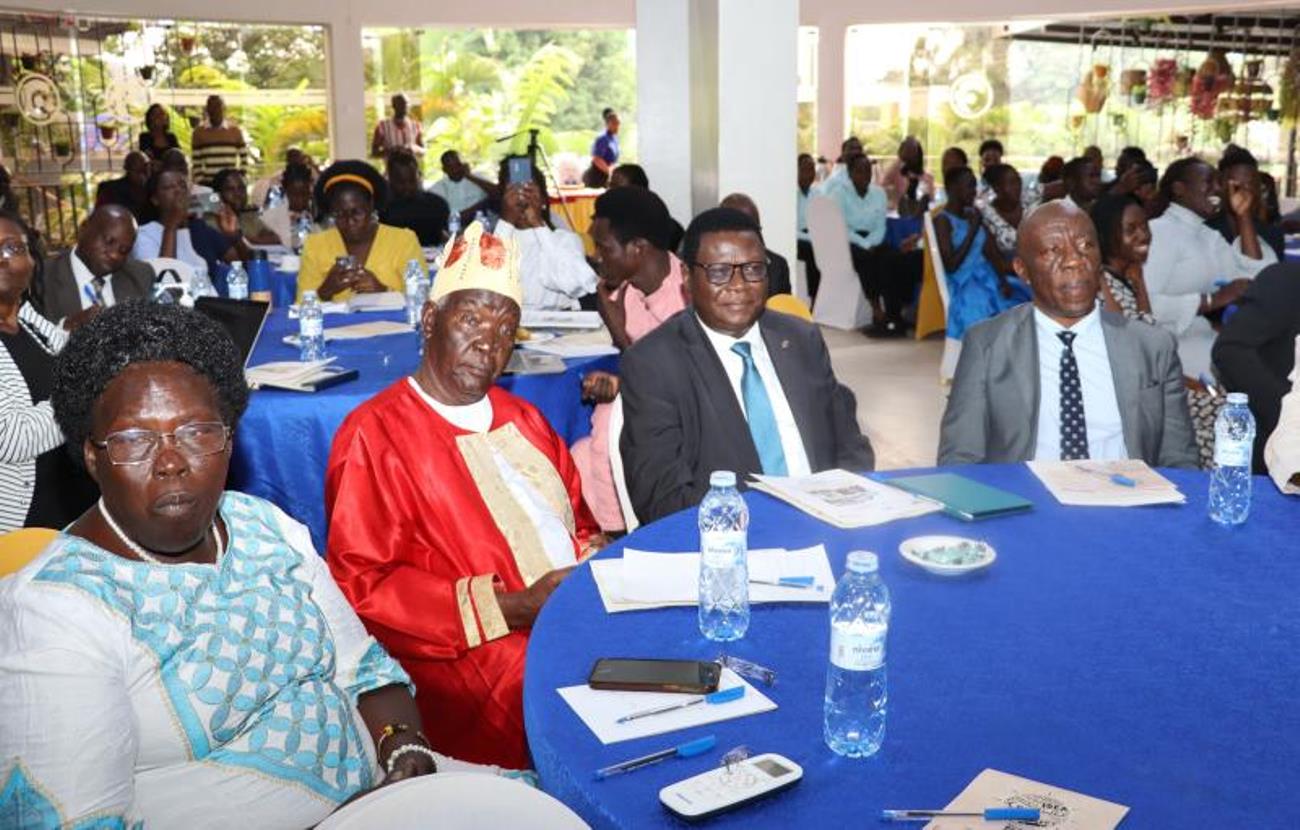
Researchers from Makerere University College of Humanities and Social Sciences (CHUSS) led by Prof. Josephine Ahikire – the Principal Investigator have called on government to revise rules pertaining to the acquisition of National Identity Cards (IDs) to address the question of the Aguu floating population of the Acholi sub- region in Northern Uganda.
The Aguus are largely the Acholi floating population who were displaced during the LRA war. Some lost their parents or were born during captivity. They think they are not part of society. Most of these, are largely street children without fathers and mothers and, do not own or have access to land and all sorts of amenities. For that reason, they have to struggle to survive and in the struggle to survive, they engage in criminal and violent activities. They way-lay people, rape, steal and storm functions to loot food.
The researchers are also calling for the implementation of the Juba Peace Agreement, particularly to address the human aspect, repair their souls and skill them for survival if the region is to return to the original social cohesion.
The communities according to the researchers have to change the orientation that creates the floating population and to accept that they were disrupted by the war and therefore understand that these children need to regain their humanness.
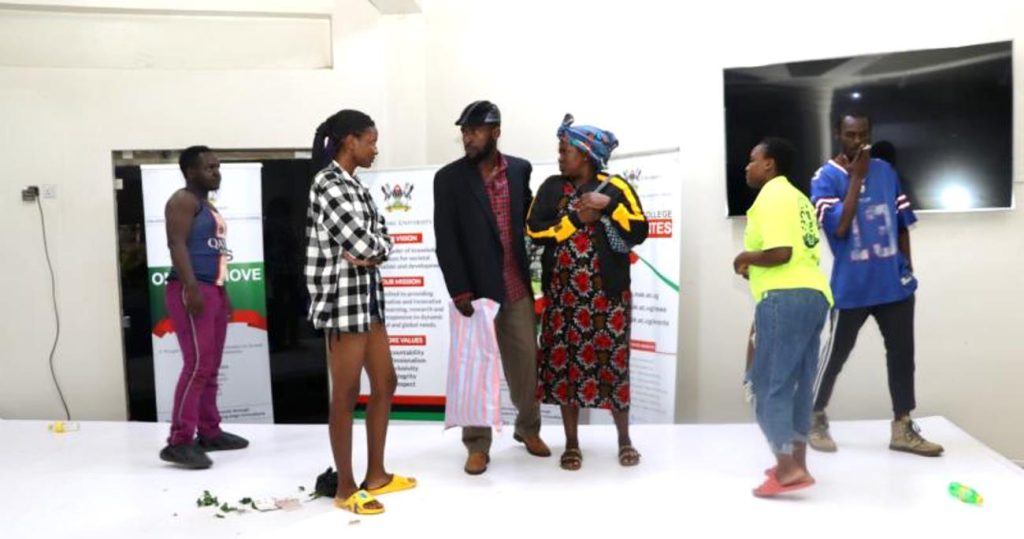
Since 2019, CHUSS in collaboration with Amani Institute, Uganda in Gulu, has been conducting a study on Gender Justice, Livelihood and Rights in Northern Uganda. The collaborative study was conducted under the Gender Justice and Security hub, funded by the London School of Economics and Political Science, through the UK Research Innovation.
The Research team comprised Prof. Josephine Ahikire (Co Director Gender Justice and Security Hub), Dr. Amon Ashaba Mwiine (Lead Researcher), Ms. Acayo Gloria (Researcher), Ms. Harriet Pamara (Researcher) and Mr. Aklam Amanya, (Researcher). The study covered the Acholi sub-region where the team purposively sampled four districts of Gulu, Pader, Amuru and Omoro.
On 14th December, 2023, CHUSS, in collaboration with Amani Institute, Uganda hosted a national convention at Fairway Hotel I Kampala to foster a national conversation with a special focus on the issue of floating populations, specifically the Aguu phenomenon in the Acholi sub region as one of the factors that undermines return to social cohesion.
This convention built on previous conversations that have highlighted categories of populations that emerged from war with a loss of social identity and belonging aimed at amplifying voice on these post war social struggles as issues with broader national implications.
The convention brought together national level stakeholders, policy makers from ministries, Departments and Agencies, local governments, academics and researchers, cultural leaders, and civil society organizations in and beyond the Acholi sub region region under the Theme: The Aguu Phenomenon: Floating Populations and the Quest for Social Belonging in Acholi, Northern Uganda.
The Principal Investigator Prof. Josephine Ahikire said, Northern Uganda was chosen on the argument that, even though the guns are silent and despite the significant investments in post war recovery, there is still violence of another kind.
The Research team according to Prof. Ahikire, explored the existing post-conflict conflicts and the gender layering within them, examined the dynamics within rights claims on land, livelihoods and gender justice and took stock of the community’s resilience, efforts and initiatives towards return to sustainable peace.
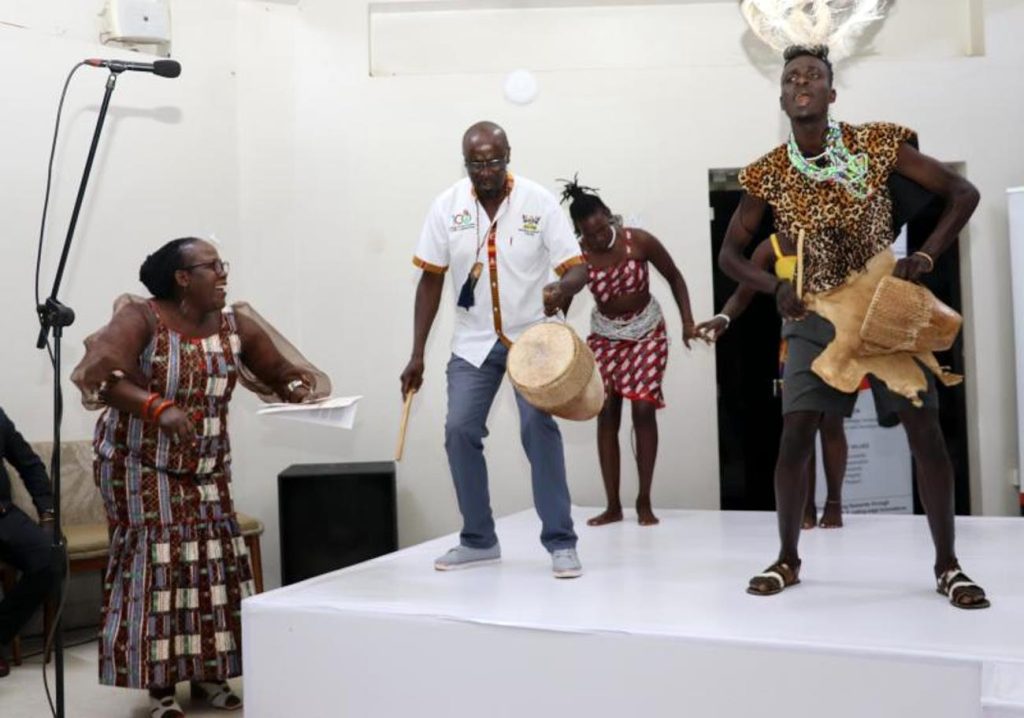
“We started with land conflicts and then as we were looking at women’s land rights, we bumped into this issue of Aguu – children mainly whose fathers are not not known, they are castigated and they are floating in a sense.
And the conversation in the fora that we have been in Gulu is that, according to the Acholi culture, there is no child that should float. That a child is always a child. So, if a child is born out of wedlock or if the father is not known, that particular child, is supposed to belong to the mothers clan,” Ahikire explained.
That sort of cultural terrain according to the PI was disrupted by the war as people got displaced, as land got grabbed and got individualized, they created new norms which have castigated these children because it means that they do not have a claim to land.
Prof. Ahikire said, the research team also heard from government officials that because the Aguus do not have claim from known clans, they cannot have national Identity cards.
“This is a very big issue but which has been securiticised as criminal gangs. These are not criminals. These are children that have been excluded from belonging and that is why we thought of performances using the theater to bring the point home that these children need belonging. It is a cry, a voice from Aguu –give us social belonging and an identity. If we don’t, in all discussions, it has been seen as a new war – they kill, rape, steal and some are armed, it is a big national issue, a gender issue and a development issue.”, the Professor warned.
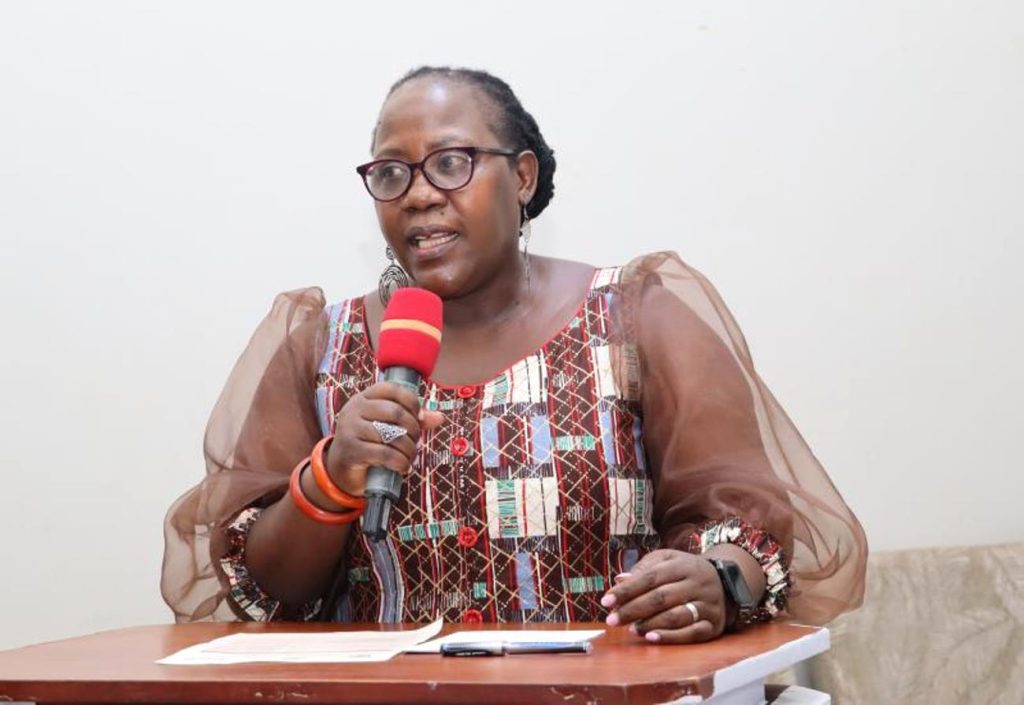
As a government, Ahikire stressed that there is need to engage the communities to change that orientation that creates the floating population and to accept that, they were disrupted by the war but now, need to regain humanness.
Prof. Ahikire emphasized that government has a role to play, because it has a bigger mandate to ensure that the region returns to the original social cohesion.
She credited government for the reconstruction of materials things like roads etc but observed that, the repair of the human aspect and the soul was not done. The disgruntled people and children born in captivity according the researchers came back to a strange place that castigates them and that is where the energy needs to be put.
“The Ministry of Gender, the Ministry of Justice and Constitutional Affairs and rules around national IDs have to change because, if a child is born and does not know the origin or the father, does that mean that a child was not bon in Uganda? These are artificial things we put as human beings to organize ourselves as clans but this should not be a major determinant for a person to get a national ID. That is something simple that government can do to ensure that these children can be long and function as citizens”, the Professor advised.
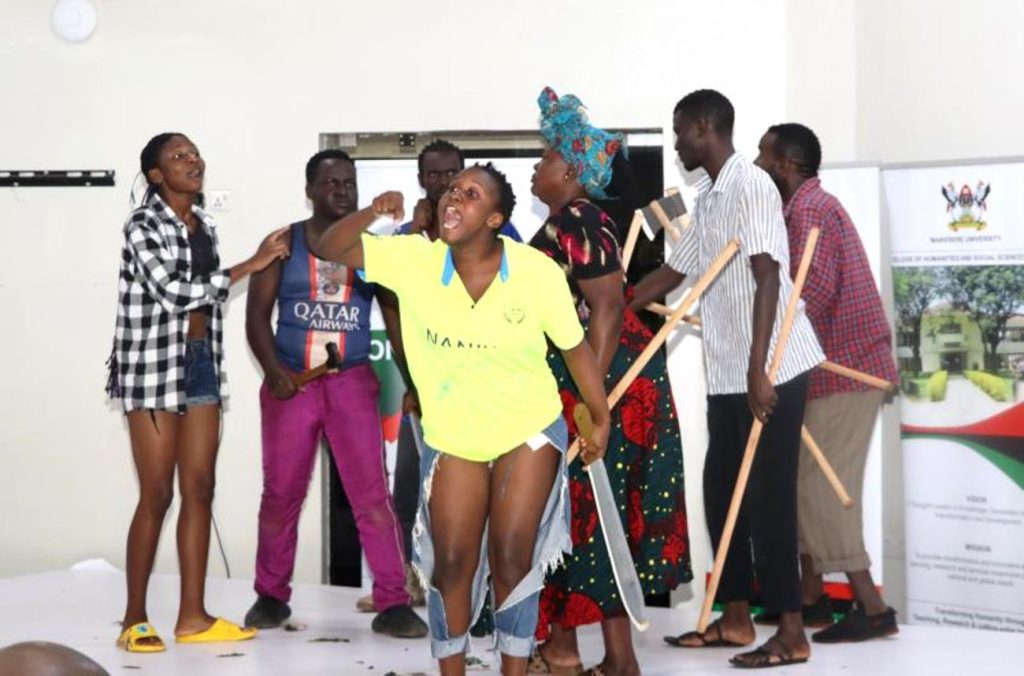
Prof. Ahikire further called for more rehabilitation of the Aguus in terms of skills- building to make them productive and self-reliant. Those who can go to school can be enabled to go to school and those who can be helped in terms of vocational skills can be helped, but, the bottom line according to Prof. Ahikire is that something has to be done quickly because the region is going into the silent war, and if it becomes of a major scale, it will not be managed because these children are becoming adults giving children and therefore the whole region and nation will be at stake.
Ahikire reported that the Aguu is subculture and un underground culture whose numbers are not known. What is known is what they do. They way-lay people from the markets, those going to the university, and storm functions such as parties, funerals and weddings causing harvoc, looting and eating food as a means of survival and some even have guns.
Because it is an under culture, Prof. Ahikire said, there has not been an effort to count them and this is the time, if they are given that chance to come out.
She acknowledged that local government in Gulu district has tried to bring some of the Aguus out through initiatives such as cleaning the city but this is not enough-it has to be a very intentional intervention that seeks these children out, show them love, and nurture them as citizens that belong to nation called Uganda, to the culture called Acholi and the neighboring districts.
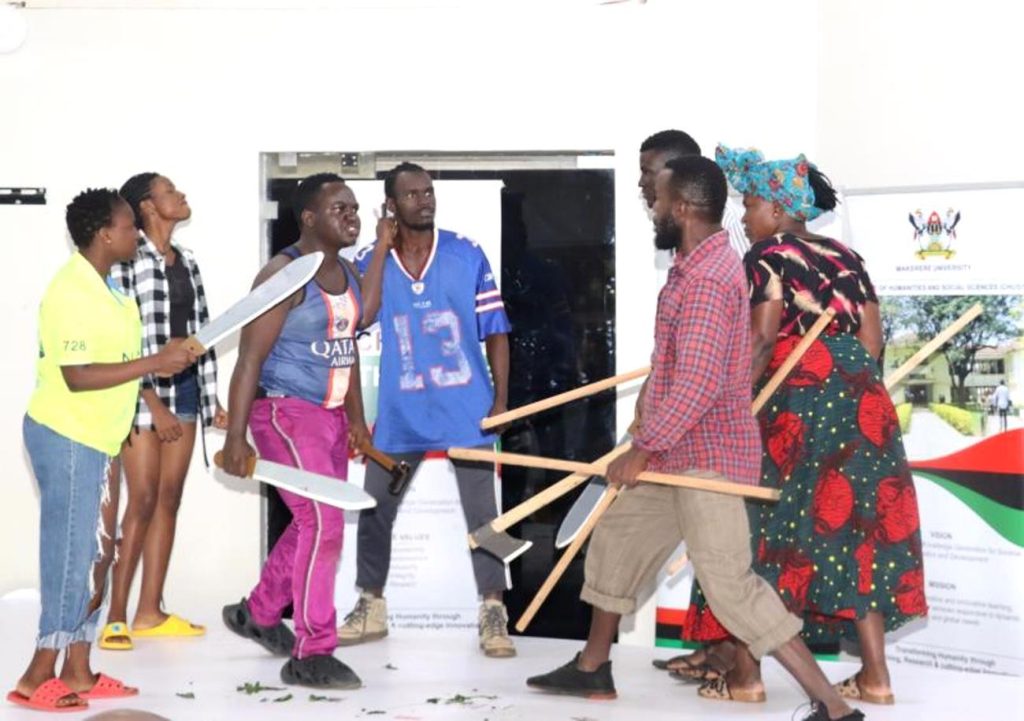
Representing the Vice Chancellor of Makerere University, Assoc. Prof. Henry Arinaitwe commended CHUSS for an inquest into the Aguu floating population in search for solutions.
“Aguus are people who are displaced, people who have no identity and for survival, are forced to involve in criminal activity and seem not to belong to a particular society. So this function is basically to find solutions for such people in Acholi sub-region.
Makerere is a research-led University. So, we research on all aspects of life in order to find solutions. This research is on Aguu population and our researchers are presenting their findings and engaging MPs from the region, government representatives, the CSOs and the representatives of the Aguus, in order to find solutions”, He said.
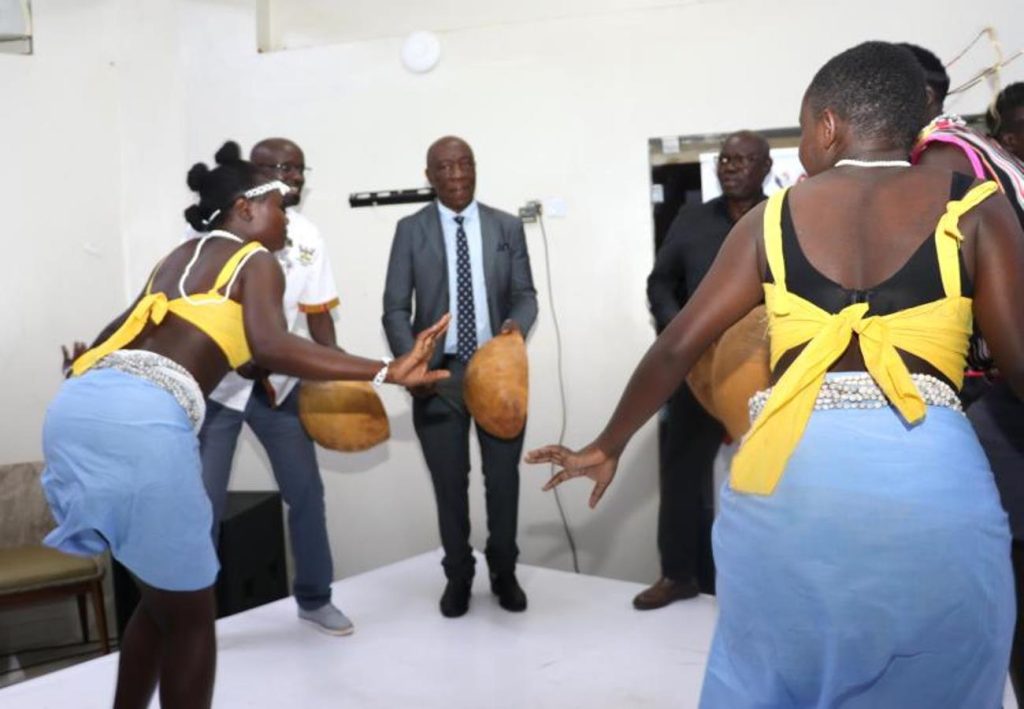
The dissemination involved theatrical performances using art and music as a tool directed by Dr. Viola Karungi and Dr. Milton Wabyona from the Department of Performing Arts and Film (PAF) From the performance, the Aguus think society is the problem and society thinks Aguus are the problem but concludes that if the common solution can be found, everybody will live a decent life have a sense of belonging and Acholi sub-region will be secure.
Government reminded to fully implement the Juba Peace Agreement
Presiding over the convention as Chief Guest, the Minister for Justice and Constitutional Affairs Hon. Norbert Mao expressed the need for government to fully implement the Juba Peace Agreement if the question of the Aguus is to be resolved.
The function was also graced by officials from the Gender Ministry, members of parliament from Acholi sub-region, NGOs and CSO, Members of the academia, children called by the derogatory name Aguu and students of Performing Arts and Film.
Minister Mao commended the researchers for the collaborative nature of the study and shading light on the status of the people of Northern Uganda. He also interested the research team to highlight the cause of the Aguu phenomenon describing the academicians as the Gurus (dispellers of darkens).
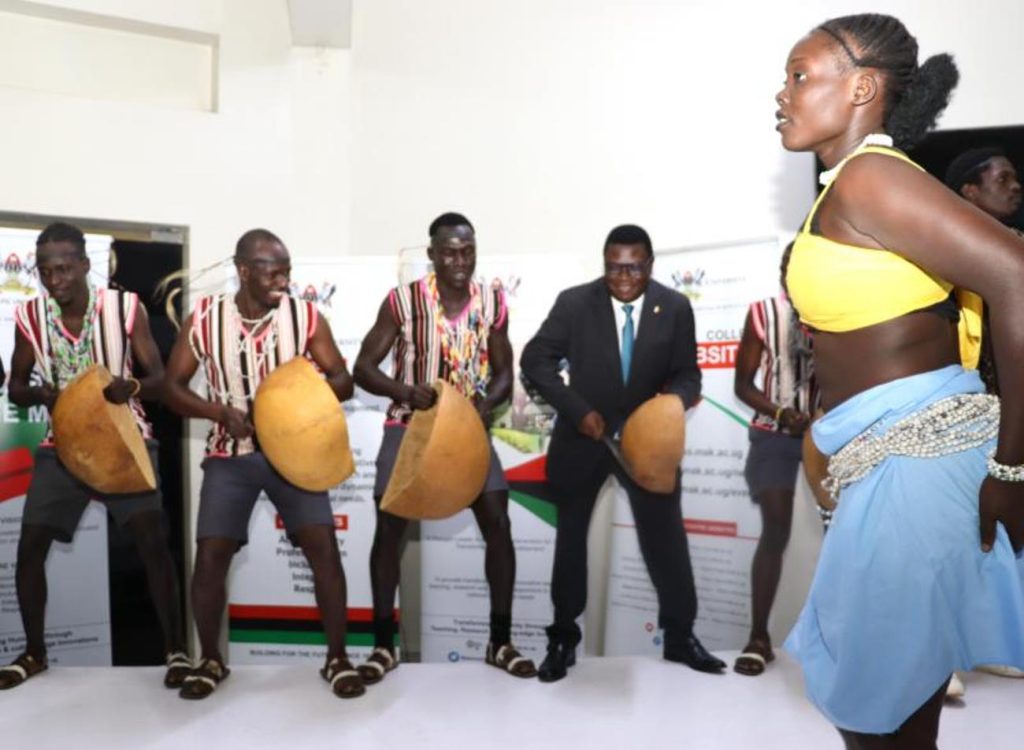
“In that respect, a university has a very important role because a university is supposed to be a protected area – a knowledge reserve, the way forests, lakes and wetlands are …what we call academic freedom – the freedom to research, the freedom to publish, the freedom to think and the freedom to express what you have found out. This therefore is a collaboration which we should salute- a collaboration between an academic institution which has the duty to shade light”. The minister commended.
Hon. Mao called for more government commitments to building a post conflict society especially the full implementation of the Juba Peace Agreement. The minister implored parliamentarians from Acholi, Teso and West Nile regions to treat the Juba Peace Agreement as their key document and manifesto.
“You must master it and use it as the standard of debating with government. Treat it as a written and bounced cheque by government, where you should go back and demand”, Hon. Mao advised
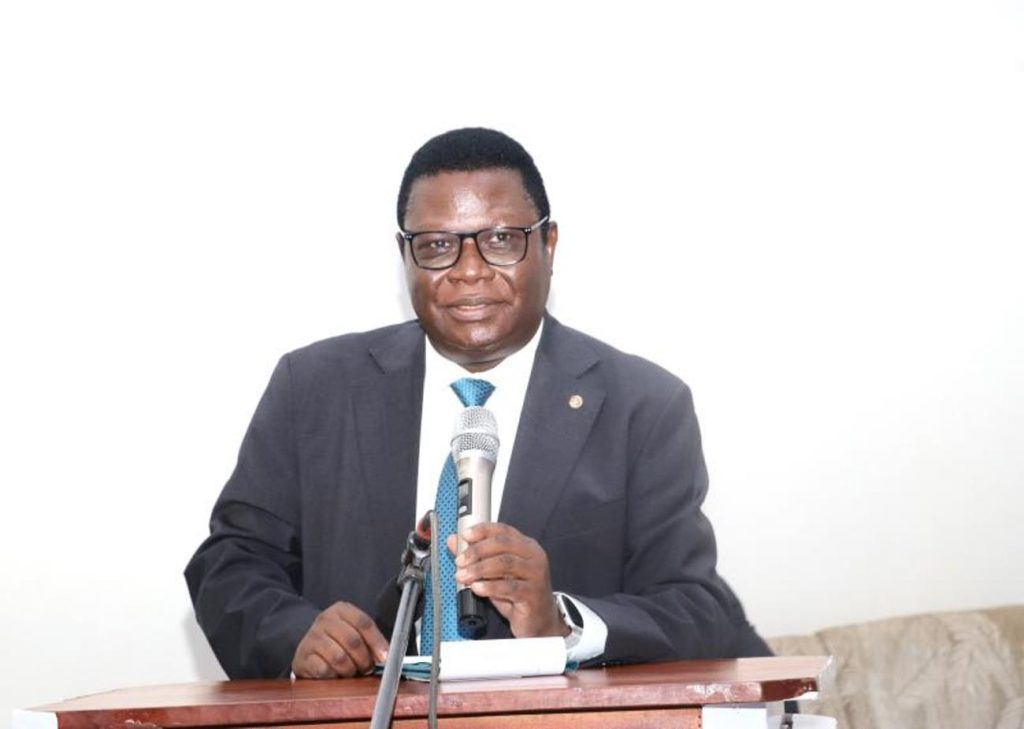
The minister also implored all stakeholders to address the Aguu question by moving away from the symptomatic assessment to finding out the causal relationship between the abortive demobilization, disarmament, reintegration and resettlement project.
“As a government of Uganda, we have framed the Aguu issue as a problem of the criminal justice system. So, we are directing the Aguu as a security problem, as criminal justice and were are not looking at it as a social and humanitarian problem”, Mao stated and hailed the university for creating awareness through theatre. The performance concluded that the blame game creates a vicious cycle as the Aguus blame society and vice –versa .
The Minister assured participants that it is the duty of the state to ensure that it is very risky to kill any Ugandan, to snatch ladies handbags, injure anyone or threaten anybody going home from the market and that, it is the duty of the state to draw that line and make sure that whoever does it, does it at a very high risk and there should be no incentive.
Hon. Mao’s central thesis is that the Aguu phenomenon which is characterized by violence and disorderly conduct is neither, genetic nor hereditary. It is a learned behavior, a coping mechanism and a response to circumstances and social environments.
“So we must look at the social environment and the circumstances. Our children have been exposed to a lot of violence and that partly explains their aggressive behavior because the major feature of being an Aguu is aggressiveness. Aguus are well-known for mobs. If there is a burial they go and position themselves and when the time for food comes, they physically disrupt the serving. When there is a wedding, there are there but they fear guns”, the minister explained.
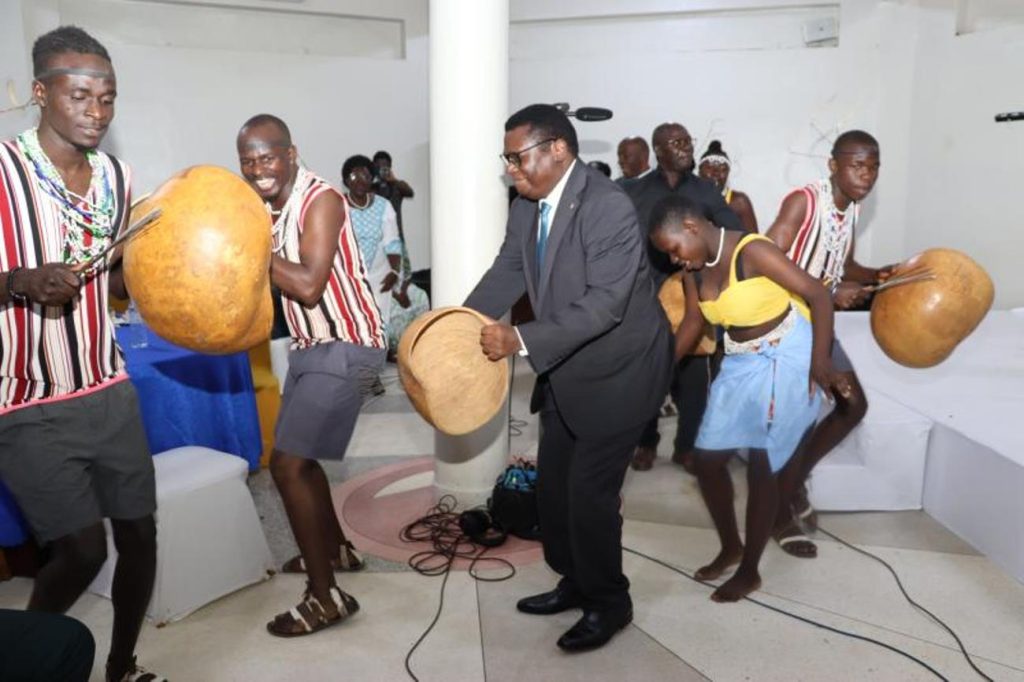
The minister also reported that the Aguus have become mercenaries and hired gangs because there is a vacuum by the security forces to enforce the laws. Otherwise, he said, they would have become irrelevant. They see that violence is the only way to get what they want and only way to solve problems.
Hon. Mao further said, the Aguu is largely, a local government issue on grounds that it is their duty to put these people in places where they can acquire new habits of waking up and knowing that money is worked for.
“These young people should get new habits because, if your habit is to wake up in the morning with a list of where there is a funeral, public function, with spies everywhere, how can it be un done?- by inculcating a culture of work. Our young people must be made to love to work”, the minister stated.
Minister Mao also attributed the Aguu phenomenon on parenting as another frontier.
“I also know that parents have resigned. It is natural to be rebellious. Given how young Uganda’s population is , we must have a program which gives young people an opportunity to turn that corner, it is never too late, let us tell our young children that it is possible to change . We must plant a seed in the minds of all children that they have potential to change for better and be useful to society”, Mao advised all including parents and relatives.
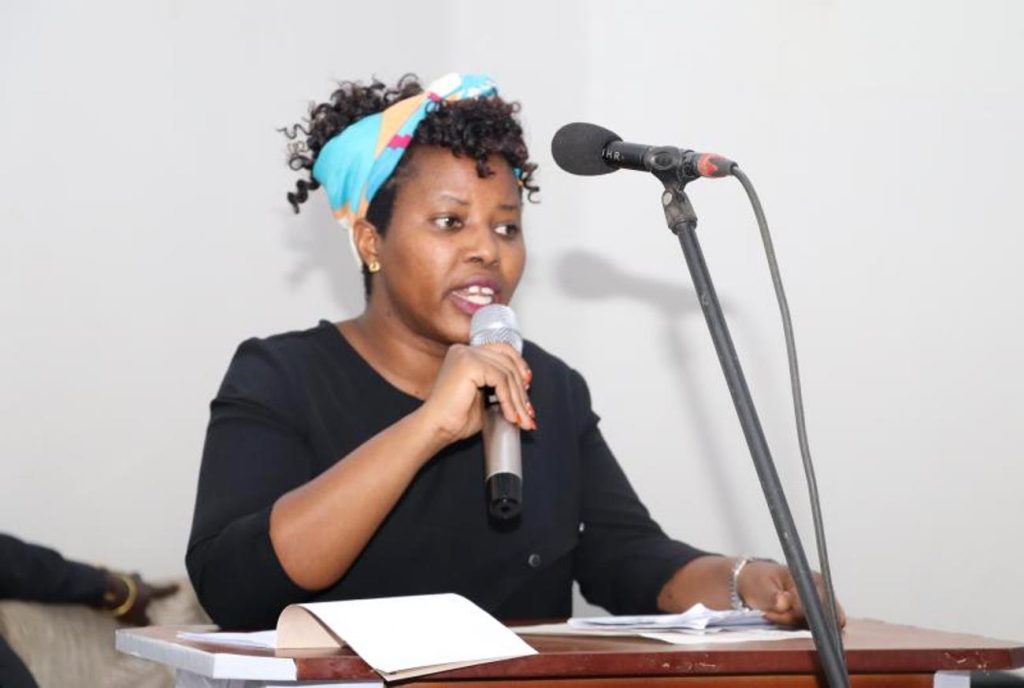
The Research Process
The Lead Researcher Dr. Amon Mwine from the School of Women and Gender Studies said the study investigated people’s everyday experiences of return from protracted war, their relationships on land, livelihood patterns, emerging post conflicts and how these influence gender relations.
The study, he said drew on a mixture of methods of collaborative knowledge production in different phases of field visits.
Dr. Mwine said the dominant discourses identified by participants in postwar Acholi was on the emerging categories of population called the floating population, a social term referring to categories of people with precarious identities in the post-conflict setting ie those born in camps, returned from the bush, people with no known parents, no clan identity and no ancestral land (identity) also, described as people who are detached from Acholi history and culture, described by denigrating labels.
Besides the theme of the floating population, Dr. Mwine said several social concerns were identified. These included land conflicts in form of contest over boundaries, shifts in customary land tenure systems and increasing intolerance of nephews and nieces fearing land claims from children with multiple identities.
The research team according to Dr. Mwine also noted the dominant conversation on social disruption and psychological trauma that hardly gain precedence in post –conflict recovery agenda. Mwine also reported that there were increasing cases of gender based violence, teenage pregnancies and psycho- social trauma and reported spike in the cases of male suicide in the region
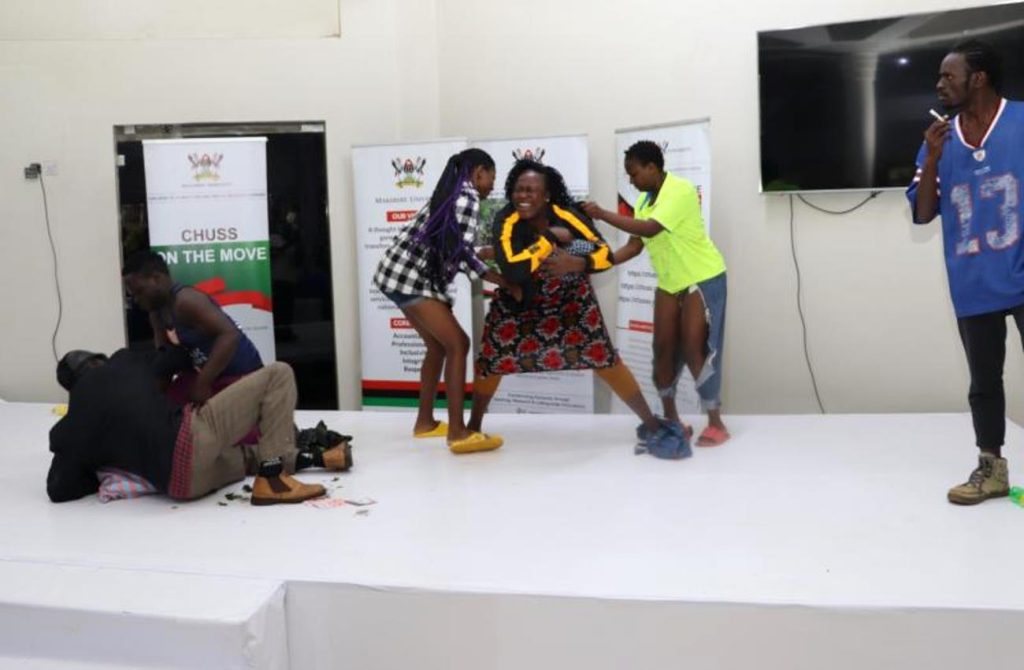
Mwine also reported that, there have been increasing reports of criminality in post-war Acholi sub region in both conventional and social media committed by the Aguu terrorizing community residents and travelers across the region. He said the Aguus were reportedly very organized groups with zones of operation with its leaders. They have identification marks like body piercing, tattoos, hairstyles that help them identify each other and communicate easily.
While some actors especially local government have intensified security crack down on what is perceived as urban criminality, Dr. Mwine said, other actors focused on rehabilitation and rethinking the role of social structures such as clan, families, religion and traditional institutions in restoring lost social values.
Policy implications
The Aguu phenomen according to Dr. Mwine has far reaching policy implications
- Issues of Identity and belonging e.g. the Aguu are complex social relations often taken for granted and not centered in post-conflict recovery programming. They are currently addressed with strategies that constitute Aguu as an issue of morality and criminality, and a problem to economic development, commonly addressed through security crackdown.
- Because of their unclear social identity, i.e. no known parents, no clear cultural heritage, and the precarious social settings they operate in, Aguu are most likely to be excluded by the formal citizenry systems eg registration of nationals such as during acquisition of Identity cards.
- Aguu are said to be using tactics and methods closely similar to the ones used during the LRA insurgency- their actions are similar to those individuals who had been in the bush; they use ruthless means like stabbing people with knives, looting people’s property, torture and no value to human life. Aguu not only instil fear in the population but also threatens sustainable peace in the community.
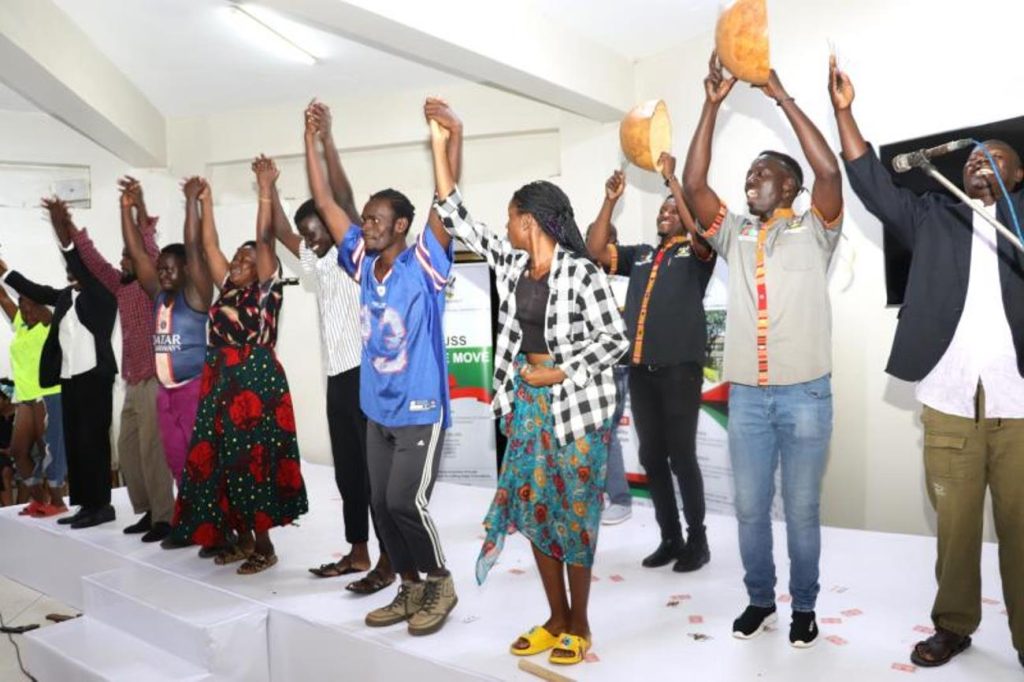
Learnings and key messages
Dr. Mwine reported that having engaged communities in several dialogues, different lessons were taken from the research process.
- One particular learning is on how economic centered post conflict programming e.g. prioritizing investment in physical infrastructure and economic ventures often takes for granted social aspects of recovery.
- The centrality of social vitality or the loss of it and its implications for the return to social cohesion in post-conflict communities is apparent.
- The question of Aguu as part of the population at the margins of the post – conflict northern Uganda does reveal the need to prioritize post-war social identity. The case of Aguu and the state measures to respond to it declaring security operations is a critical juncture. It points to the need to rethink the place of culture, traditional systems in enabling belonging and social cohesion.
- Rediscovering social connectedness, cultural heritage and a sense of identity in the Acholi community might be one of the core aspects needed to address the Aguu question and facilitate a return to relative social cohesion.
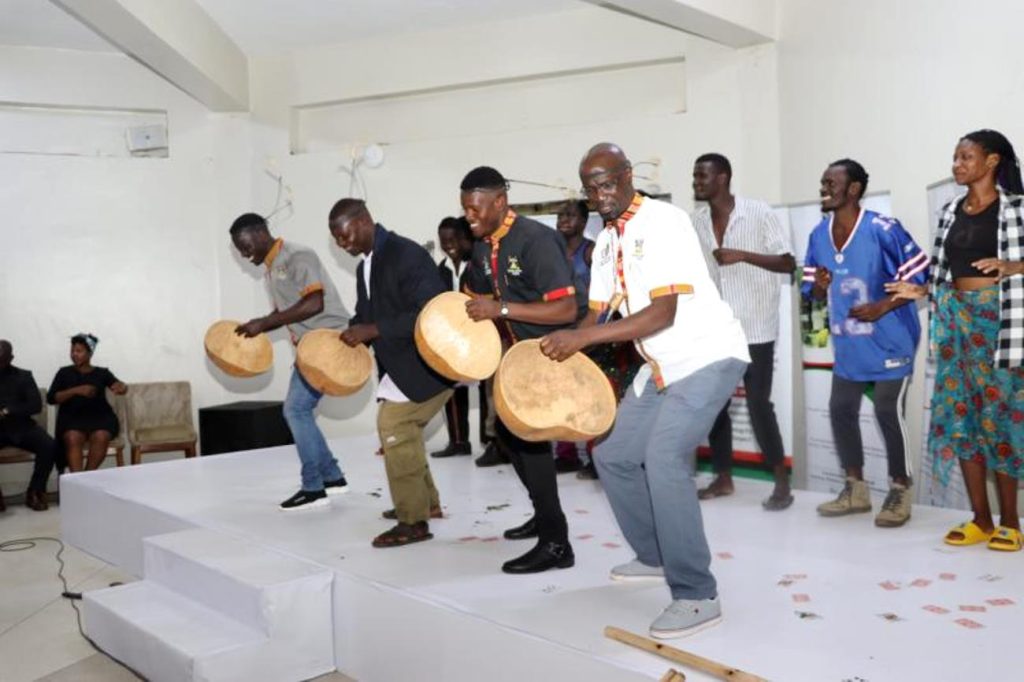
You may like
-
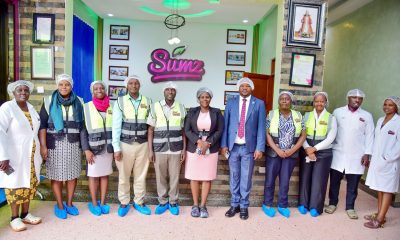

Makerere Explores Strategic Industry Partnership with Psalms Food Industries to Strengthen Manufacturing Innovation
-


Makerere Graduation Underscores Investment in Africa’s Public Health Capacity
-


Botswana Delegation Visits Makerere’s Public Investment Management Centre to Study Sustainable Training Model
-


Makerere University commemorates 13 transformative years of partnership with Mastercard Foundation
-


200 UVTAB students graduate: CEES emphasizes Skills, Integrity and Community Impact
-


Mak News Magazine: February 2026
Humanities & Social Sciences
Meet Najjuka Whitney, The Girl Who Missed Law and Found Her Voice
Published
1 week agoon
February 23, 2026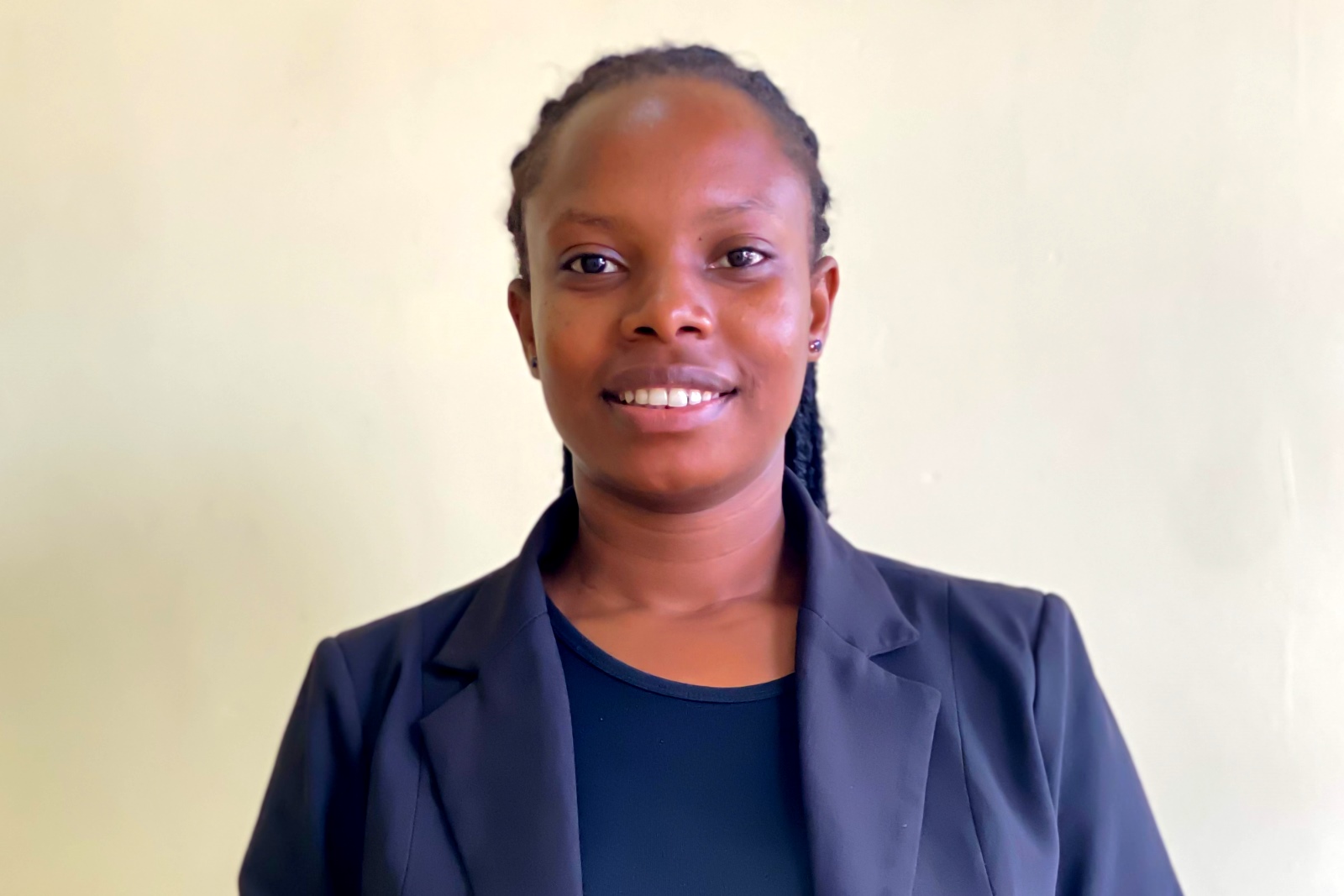
On the morning of Friday, February 27, when the academic procession winds its way across Makerere University’s Freedom Square for the last day of the 76th Graduation Ceremony, Whitney Najjuka will walk into history with a number beside her name: 4.46.
At Makerere, that number means First Class Honours. It means the Vice Chancellor’s List. It means she graduates as the only First-Class student in Journalism and Communication this year. But numbers, as Whitney has learned, rarely tell the full story.
Born on March 27, 2002, in Nabbingo, Kyengera Town Council, to Margaret Kusemererwa and Fred Kasirye, dreamt she would do Law, one of the disciplines, prestigious, almost inevitable next steps for a student who had excelled in secondary school. She had done everything correctly. Studied hard. Scored well. Followed the script.
But Makerere University had other plans. She missed the pre-entry mark, but found her name under Journalism and Communication, another prestigious course offered by the Journalism and Communication Department at Makerere University.
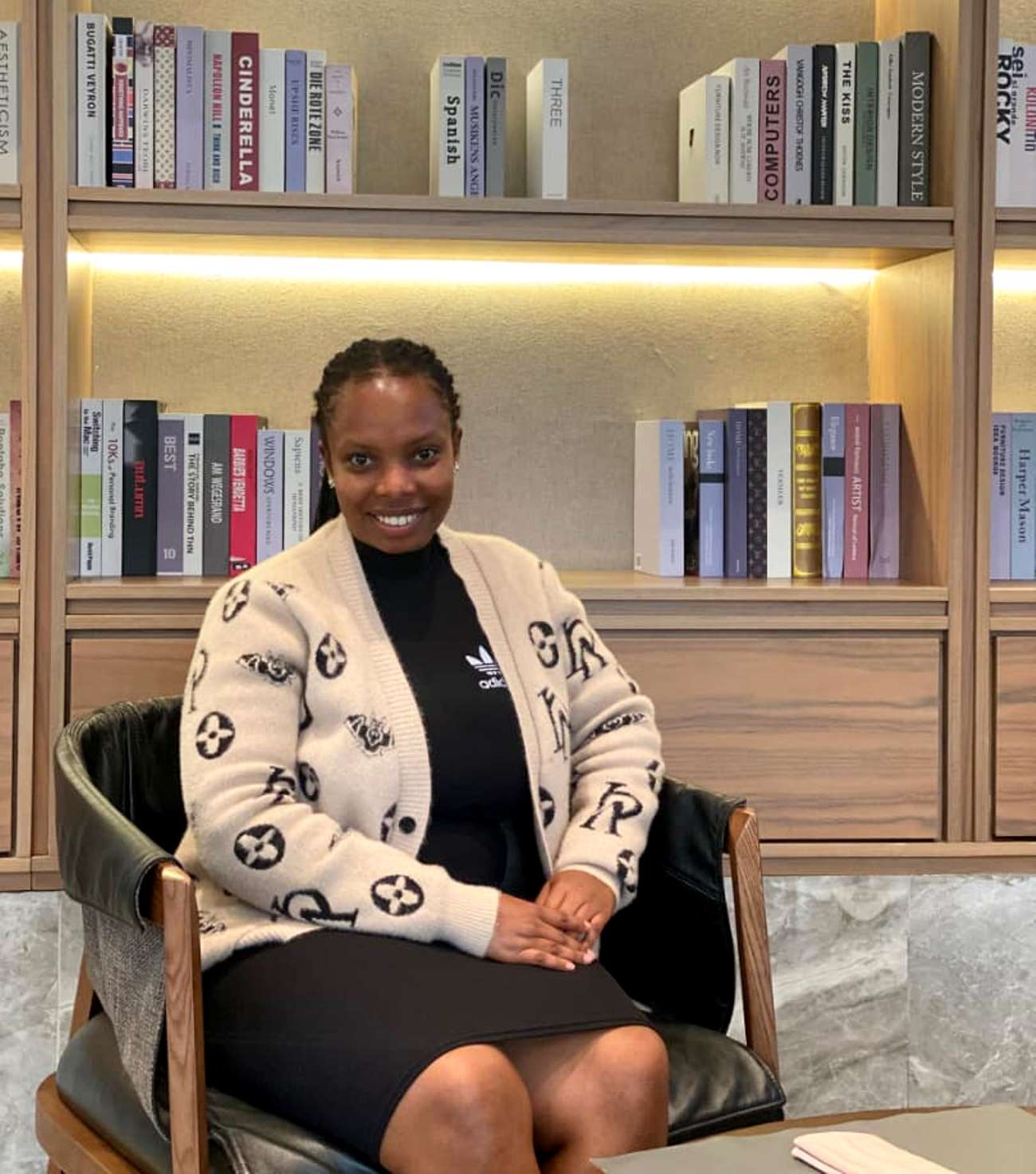
Najjuka began her academic journey at Muto Primary School in Buwama, earning 8 aggregates in the Primary Leaving Examination, a performance that positioned her strongly for secondary school.
She would later join St. Lucia Hill School, Namagoma, where she earned 20 aggregates at O-Level and 17 points in History, Luganda, and Divinity at A-Level.
Missing her dream course, Law, felt at first, like a detour. But Whitney was encouraged by Sanyu Christopher, her uncle, and she settled for a government-sponsored slot in the Bachelor of Journalism and Communication at Makerere, which she had applied for before.
She entered uncertain. But she graduates transformed.
The Pivot That Became a Purpose
Whitney speaks of her early university days with candor. She did not arrive at the Department of Journalism and Communication with a burning childhood ambition to be a journalist, but because another door had closed.
Then, Social and Behavior Change Communication happened. Applied Strategic Communication happened. She began to see media not as headlines and microphones, but as architecture, shaping how societies think, argue, and act.
The turning point came in her third year. The Female Journalist Foundation published her story on Sexual Gender-Based Violence (SGBV) and its emotional toll on survivors. What startled her was not its publication but the reaction. Comments flooded in. Debates ignited, especially about the role of men in combating GBV.
“I realized media doesn’t just report,” she says. “It frames how society views a crisis.”
Her voice, once tentative, had entered a national conversation.
The Discipline Behind 4.46
At Makerere University, a First Class CGPA is not built on brilliance alone but on ritual.
Whitney’s ritual began with showing up, on time, every time. She treated lectures as appointments with her future self. She refused to confine her learning to the syllabus. While attending workshops at the Aga Khan Graduate School of Media and Communication and obtaining external certifications, she sought and was open to mentorship through the Public Relations Association of Uganda (PRAU).
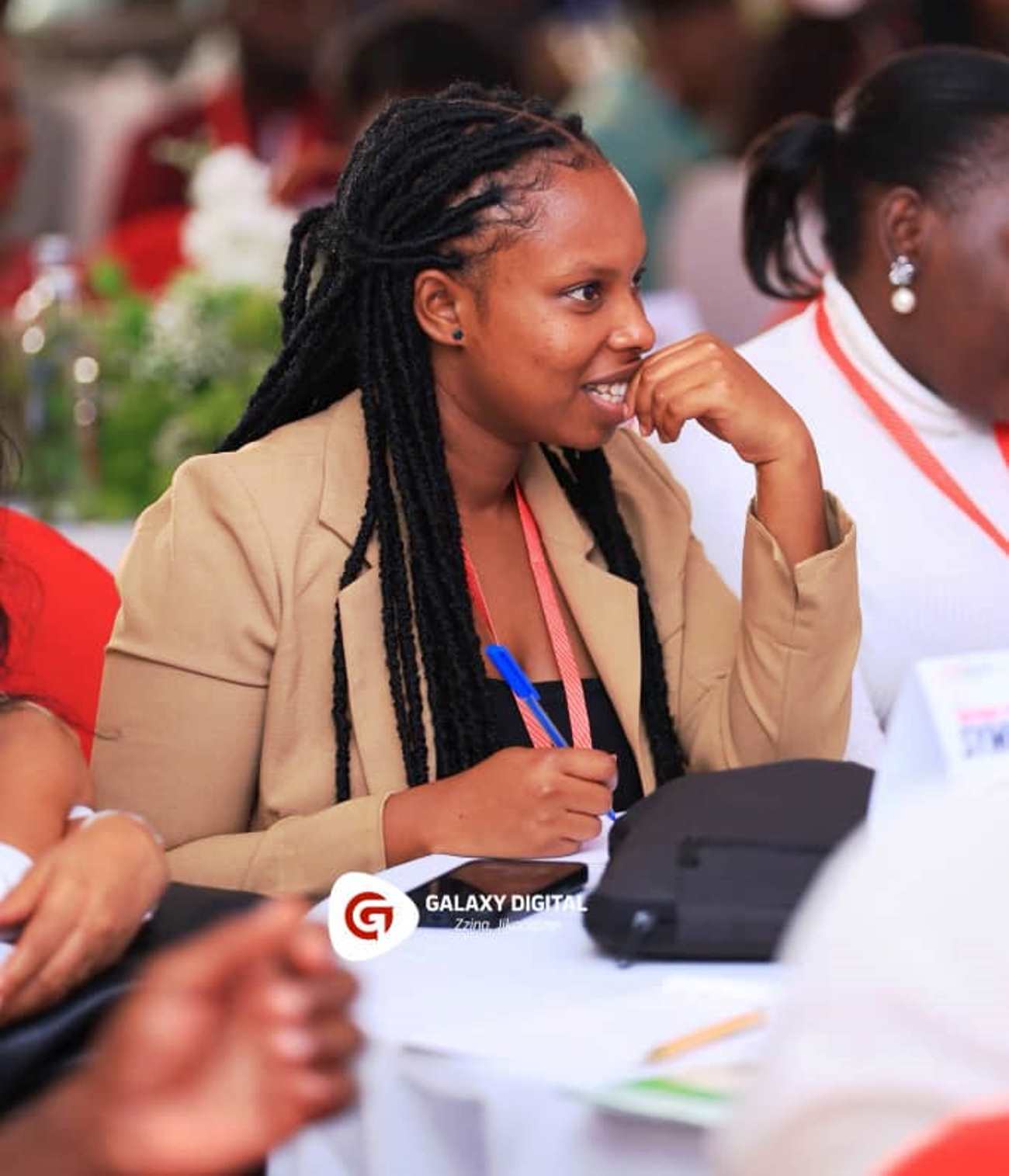
She wanted theory anchored in practice. And then there was the commute.
From Nabbingo, a hill in Wakiso District, some 18.6 km to Kampala, where the Makerere Main campus is situated, and back, nearly 20 hours a week dissolved into Kampala traffic. Two-hour journeys before 8:00 a.m. lectures. Dust. Noise. Headaches. She learned to manage energy the way others manage time. Fatigue became a tutor in resilience.
“I had to be intentional with every remaining hour,” she says. “Excuses were not an option.”
Learning to Practice Communication
If classrooms taught her analysis, presentations taught her courage. Pitching projects, defending research, and standing before peers quick to critique forced her to think on her feet. She was no longer simply studying communication; she was practicing it.
In 2024, the AGMES Fellowship at the Aga Khan Graduate School of Media and Communication pushed her further. She received funding to produce a capstone project on the mental impact of gender-based violence on survivors. She identified sources, conducted interviews, handled trauma with care, and worked with professional editors.
The Communication, she learned, is logistics and ethics as much as eloquence.
The Future She Sees
Whitney is optimistic about Uganda’s media landscape. The digital shift, she believes, has democratized influence. Young communicators are no longer confined to legacy newsrooms or offices.
Yet she sees a gap in the absence of structured research on sustainable, ethical, profitable independent media ventures in Uganda. Her ambition is not only to practice communication, but to study it. To produce data-backed frameworks that help young Ugandans transition from graduates to media entrepreneurs.
She wants to make the impact scalable.
What Remains
As the only First-Class graduate in her cohort, she is careful not to mythologize herself. “Success isn’t brilliance alone,” she says. “It’s a daily commitment when nobody is watching.”
Even before graduation, Whitney had stepped into the industry through a mentorship internship at Capital One Group (COG EA Ltd), a strategic marketing communications agency operating across East Africa.
At Capital One Group, we spoke to Paul Mwirigi Muriungi, the Managing Director and Head of Strategy, who spoke of Najjuka as a progressive and intentional young professional who approaches her work with curiosity, maturity, and responsibility.
“Her attitude is exemplary. She is teachable, receptive to feedback, and eager to grow. While technical skills can be taught, character, work ethic, and mindset determine long-term success, qualities that Whitney consistently demonstrates. Given her academic excellence and professional application, we believe she has a bright future both at Capital One Group and within the wider communications industry. She represents the kind of talent the profession needs: thoughtful, adaptable, and committed to excellence.
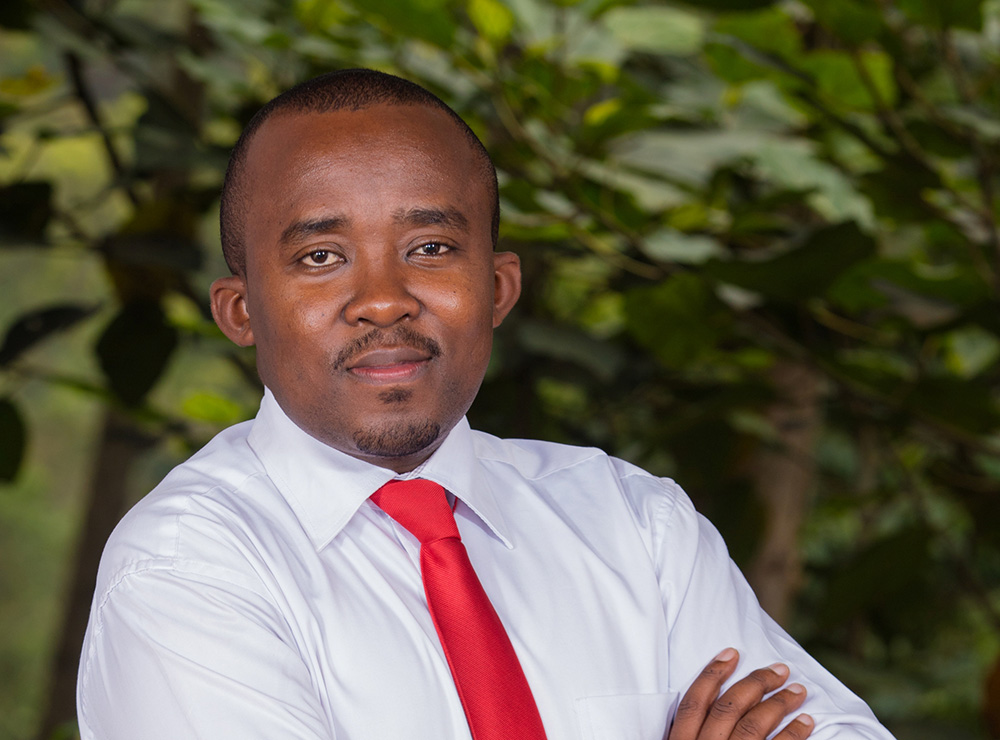
“We look forward to seeing her next chapter unfold,” says Mwirigi.
Najjuka’s gaze extends beyond her own trajectory. She speaks of what the Department could become. Furnished and equipped with industry-standard equipment, newsroom simulations, and deeper investment in data journalism as prayers. Her excellence is not self-congratulatory, but it is forward-looking.
“The University should support the Department to procure industry-standard equipment. Access to high-quality cameras, sound booths, and updated editing software like Adobe Creative Suite is critical to our learning environment,” she says.
Adding that, “We need a newsroom simulation, a physical or digital space where students work under real-time deadlines to produce content for the public. That would prepare us for industry and even strengthen the University’s own media platforms.”
In an era defined by metrics, algorithms, and digital traceability, data journalism is no longer a niche skill but a sine qua non of credible reporting. “There should also be more focus on data journalism and search engine optimization. These are no longer optional skills. Students would benefit immensely from stronger training in these areas.”
Dr. Aisha Nakiwala, the Head, Department of Journalism and Communication, says the faculty are very proud that she is graduating with a First Class—the only one in this year’s cohort.
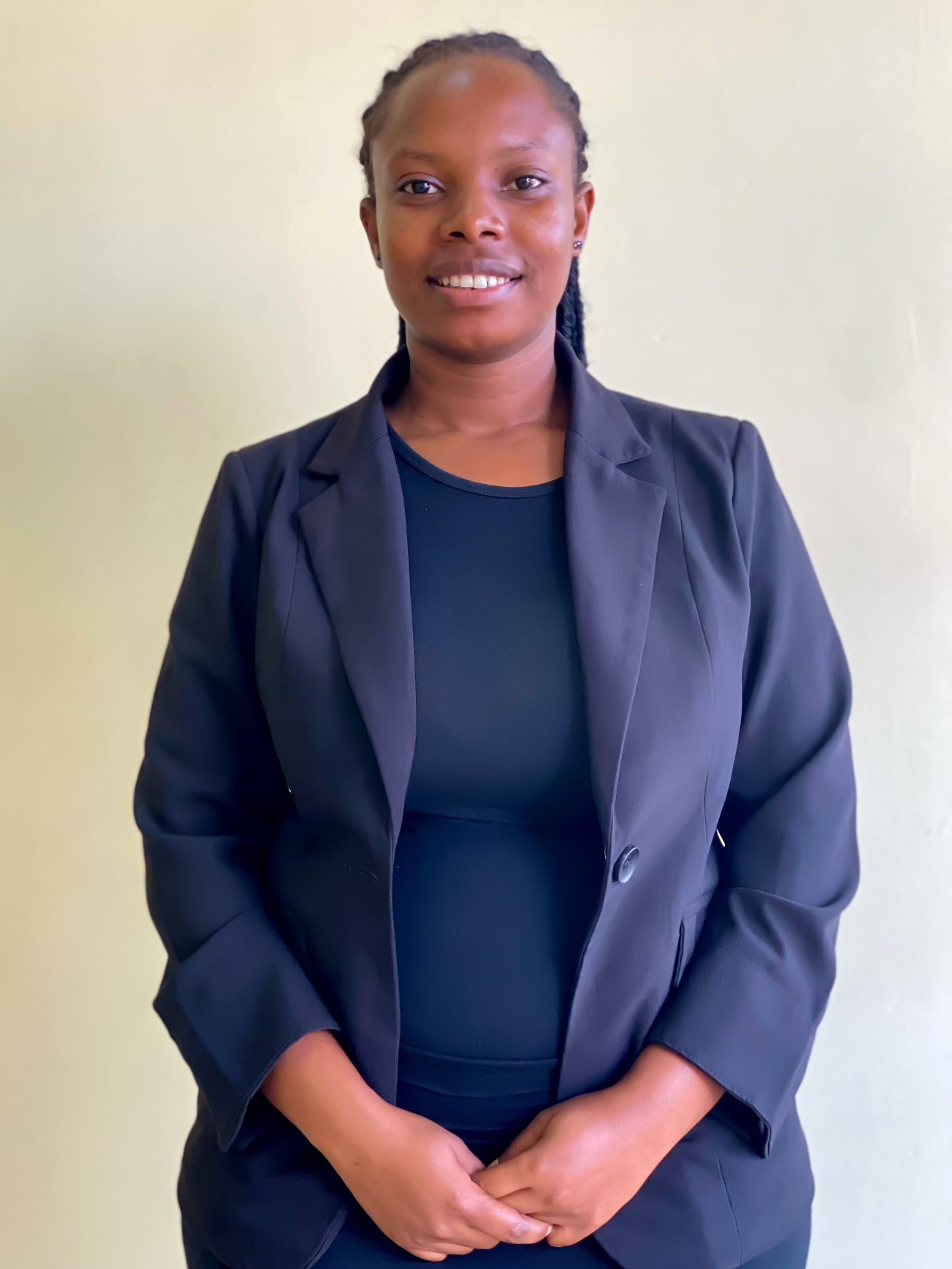
“This achievement reflects not only exceptional intellectual ability but also discipline, resilience, and sustained dedication to the highest standards over four years. Graduating with first-class honors is no small feat; it requires consistent outstanding performance.
“Her accomplishment sets a powerful example for continuing students and reaffirms our department’s commitment to nurturing excellence. We are confident she will make meaningful contributions to the communication profession and society at large,” says Dr. Nakiwala.
On graduation day, applause will crest and recede. The gowns will fold back into wardrobes. The transcripts will be filed away in cabinets. But something quieter will endure; a young woman from Nabbingo who once missed her Law mark, who spent 20 hours a week on the road, who discovered that storytelling is power, and who now walks into Freedom Square not by accident, but by intention.
Life, as she has come to understand it, lives on.
Humanities & Social Sciences
Dr. Pamela Khanakwa Honored for Steering Record 18 PhD Candidates for the Mak 2026 Graduation
Published
1 month agoon
January 23, 2026By
Jane Anyango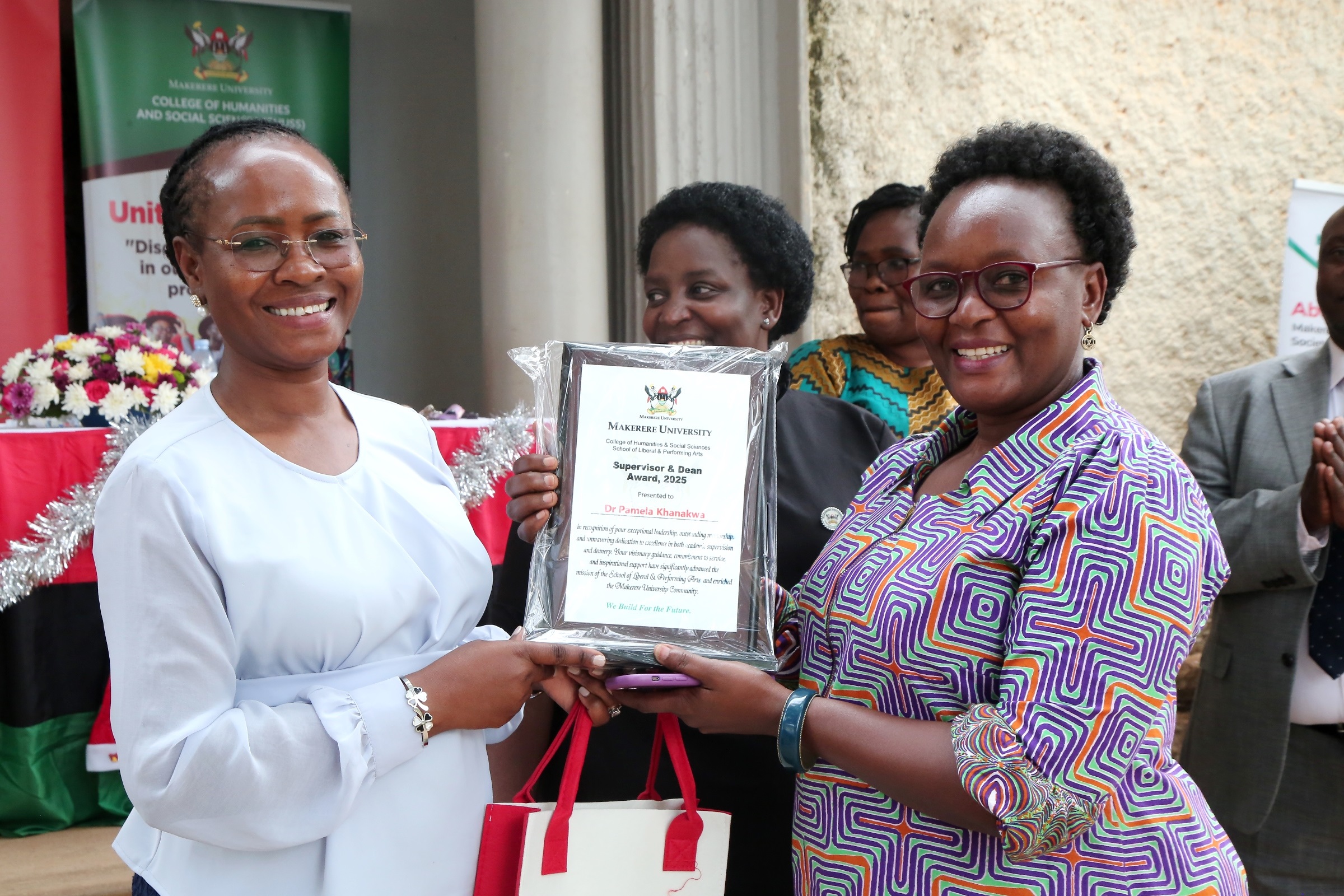
Six personally supervised, three completed in record time, as School of Liberal and Performing Arts sets a historic milestone. Dr. Pamela Khanakwa got the Award as Best PhD Supervisor and Dean
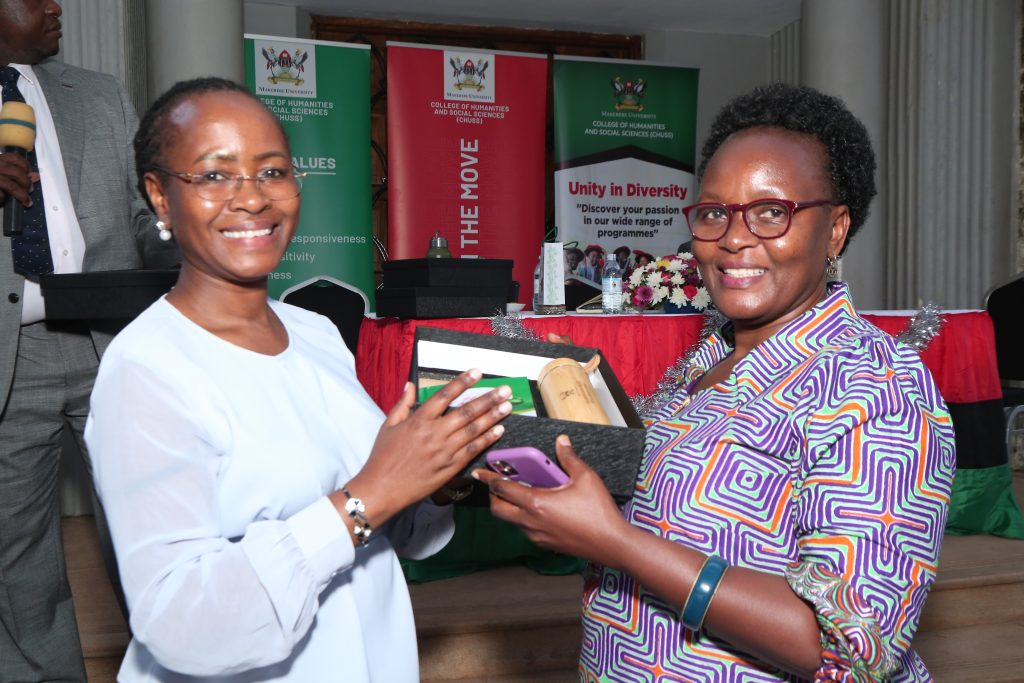
A Historic Academic Milestone for SLPA
The College of Humanities and Social Sciences (CHUSS) recognised the Dean of the School of Liberal and Performing Arts (SLPA), Dr. Pamela Khanakwa, for outstanding academic leadership that has seen the School field 18 PhD candidates for the next 2026 Makerere University Graduation Ceremony scheduled for 24th-27th February. Remarkably, six of these doctoral graduates were directly supervised by Dr. Khanakwa, with three completing within the official three-year timeframe, an exceptional achievement in graduate training. The recognition was announced during the CHUSS End-of-Year Get-Together, where staff applauded Dr. Khanakwa’s dedication, humility, and relentless commitment to postgraduate supervision and timely completion.
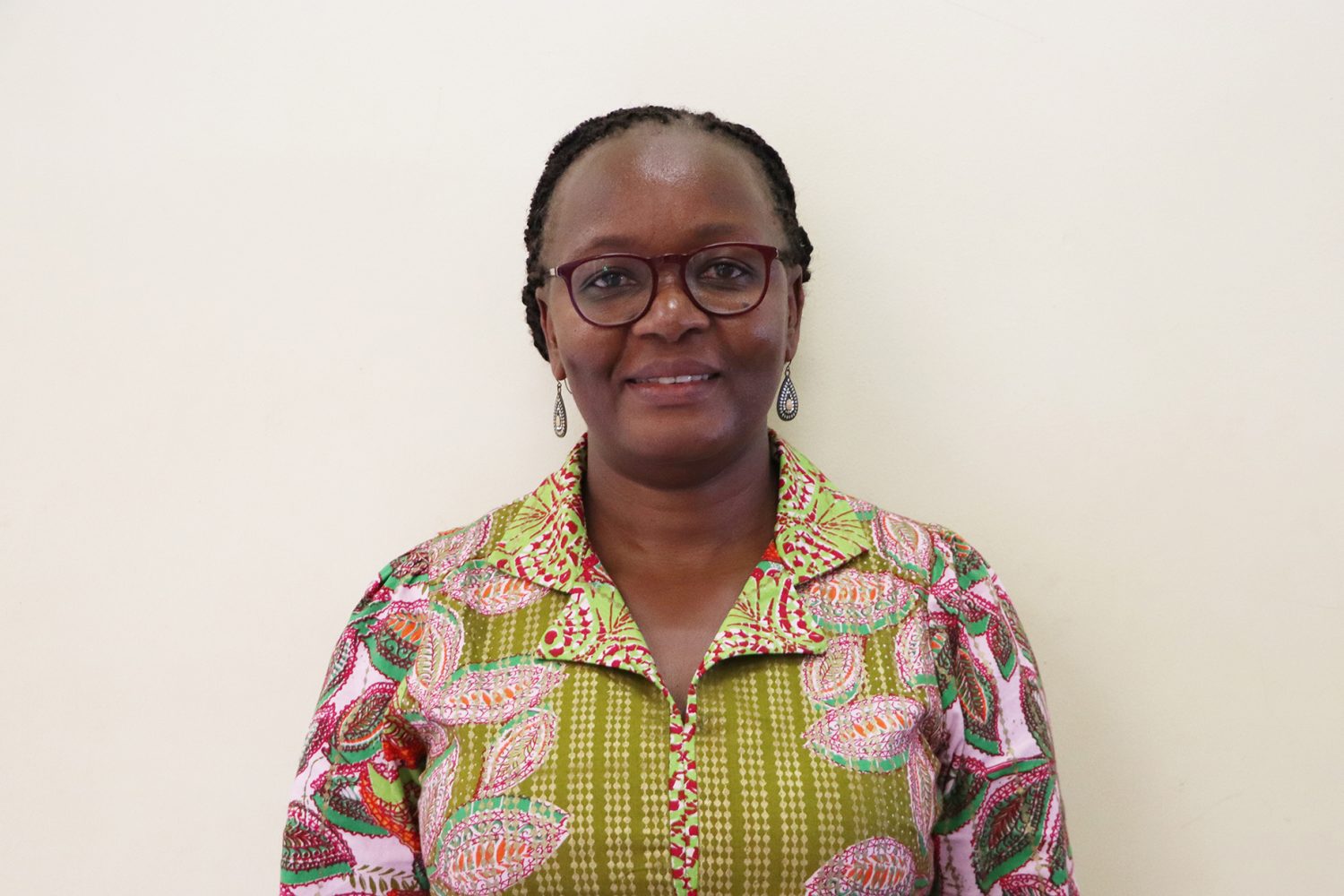
Message to Academic Staff
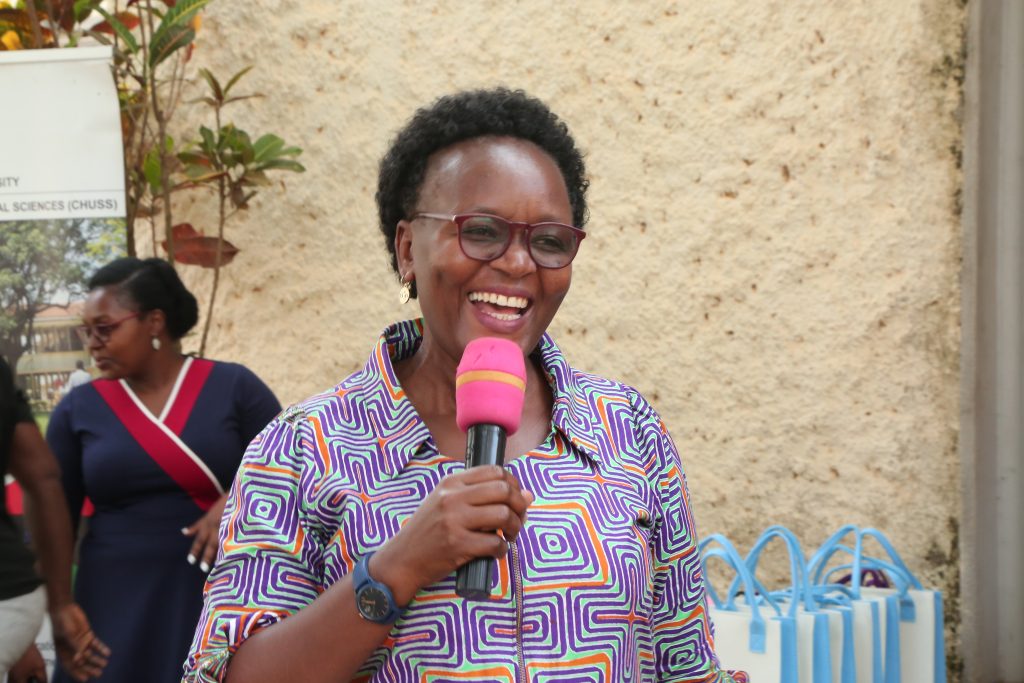
Q: What message do you have for your staff following this achievement?
Dr. Khanakwa:
First, I celebrate my staff and thank them for their dedication to supervision and student support. Academic work is demanding, and material rewards are often limited, but the true satisfaction comes from seeing students succeed.
I encourage my colleagues to remain committed. Yes, the workload is heavy, but many things are possible with dedication and teamwork. Let us continue working for the good of our students, our School, and Makerere University.
Leadership Rooted in Humility
Q: Many colleagues describe you as humble, down to earth, and hardworking. What shapes this character?
Dr. Khanakwa:
I think it is largely my upbringing. My mother was a primary school teacher from the 1950s until the mid-1980s. She worked extremely hard to raise us, combining teaching with farming to ensure we had school fees and basic needs. From her, I learned humility, discipline, and the value of hard work.
I also learned that leadership positions are temporary. You occupy them today, and tomorrow you move on. So humility is essential.
My graduate training also shaped me significantly. My PhD supervisor emphasized that graduate study is a full-time job and that results matter more than noise. Let people see your work through outcomes, not announcements.
Supervision as a Two-Way Commitment
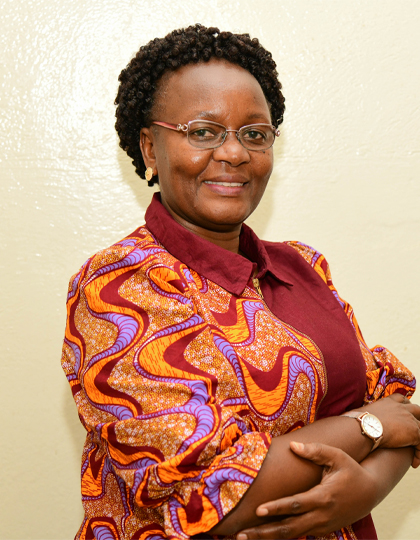
Q: How would you describe your supervision style?
Dr. Khanakwa:
I read my students’ work thoroughly, word by word. Sometimes my comments are tough, but they are honest. Supervision is a two-way commitment. I give feedback, but students must also respond and remain engaged. When that relationship works, progress happens.
Balancing Leadership, Scholarship, and Family
Q: How do you balance being a Dean, scholar, wife, mother, and daughter?
Dr. Khanakwa:
Honestly, I am not sure I balance perfectly. My mother lives far away in Bukwo, so visiting requires careful planning. My children grew up understanding the demands of academic life. I pursued my PhD in the United States and spent long periods away, but we adapted as a family.
Work has become part of my lifestyle. I use weekends to read dissertations, review manuscripts, and write. Sometimes my children ask if I ever sit without working, but this is the commitment I made. As we often say jokingly, “We humbly applied for the job, so let us do the job.”
Scholarship Beyond Supervision
Dr. Khanakwa is also an active scholar and editor. In the past year alone, she has:
- Edited scholarly volumes on archives, memory, method, and pedagogy
- Published a book with Routledge Companion
- Co-authored journal articles and book chapters with graduating students, including Priscah Asiimwe and Anatoli Lwasa Mpijja
“I feel an obligation to write with students,” she notes. “It takes time, energy, and commitment, but it is part of academic mentorship.”
Who Is Dr. Pamela Khanakwa?
Dr. Pamela Khanakwa is the Dean, School of Liberal and Performing Arts, College of Humanities and Social Sciences, Makerere University. She is a seasoned scholar, supervisor, administrator, and mentor whose leadership continues to redefine graduate training excellence. Details about Dr. Pamela Khanakwa can be accessed at: https://chuss.mak.ac.ug/en/personnel/pamela-khanakwa/
More details are available in her attached curriculum vitae.
The CHUSS End- Of-Year-Get-Together
On 12th December, 2025 the college leadership organised a get-together end of year gathering to take stock of the achievements, challenges and brainstorm together on how to move forward. The event was marked by entertainment, team building games, appreciation speeches, sharing a meal and a Christmas package for every staff
Retirees and staff recognised
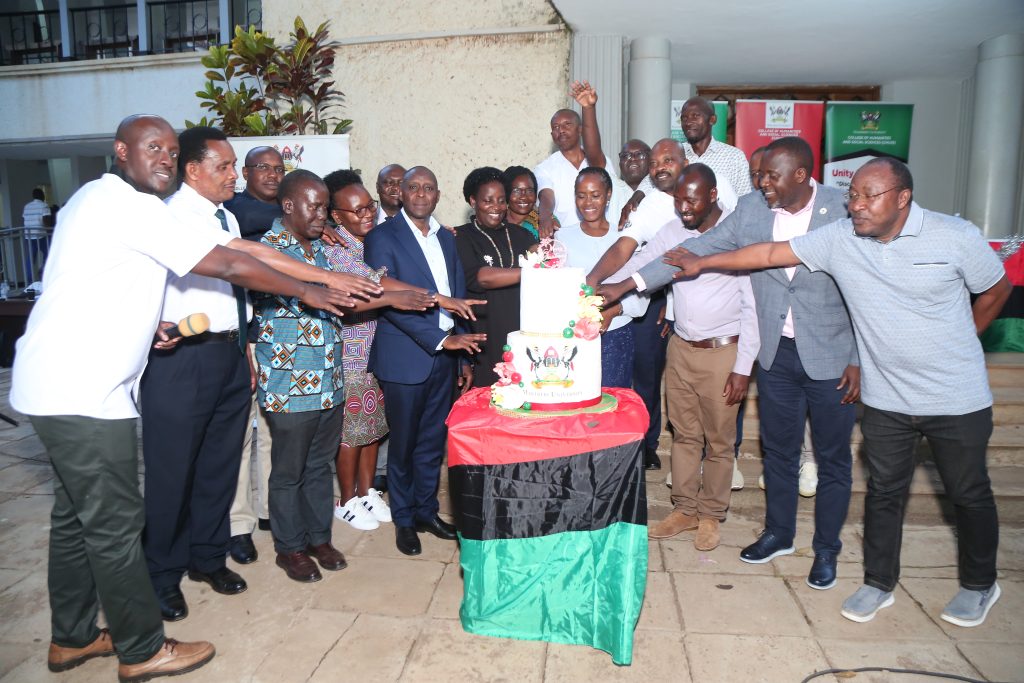
Five retired staff Dr. Micheal Wangotta Masakala, Dr. Anatole Kirigwajjo and Dr. Jackson Kizza Mukas (all from the School of Languages, Literature and Communication), Assoc. Prof. Florence Nansubuga (School of Psychology), Dr. Tusabe Gervase (School of Liberal and Perforing Arts) and Ms. Scovia Nganda Sekweyama (secretary from the School of Social Sciences) were recognised for their dedicated services to the university.
In addition to Dr. Pamela Khanakwa’s Award as Best PhD Supervisor and Dean, Ms. Birabwa Florence scooped the award of Best Registrar of the year. Birabwa is the registrar for the School of Liberal and Performing Arts.
Administrative and support staff including Ms. Mary Gyezaho and Annet Kashumbusha(both administrative secretaries in the Principals office), Farouq Lule (IT Officer), Godfrey Kakooza (cleaner), Charles Sebuguzi (driver) and Jane Anyango (Communications officer) were recognise with awards for outstanding service. Dr. Mohamed Mayanja Kajumba was from the School of Pyschology was recognised as the person with an outstanding talent in Handwriting.
The celebrations held in the Arts quadrangle were graced by the Vice Chancellor Academic Affairs Prof. Sarah Ssali and the Deputy Vice Chancellor in charge of Finance and Adminstration Prof. Ireeta Tumps.
Humanities & Social Sciences
Ugandan Journalists Trained on Peace and Gender-Sensitive Reporting Ahead of 2026 Elections
Published
2 months agoon
January 9, 2026By
Jane Anyango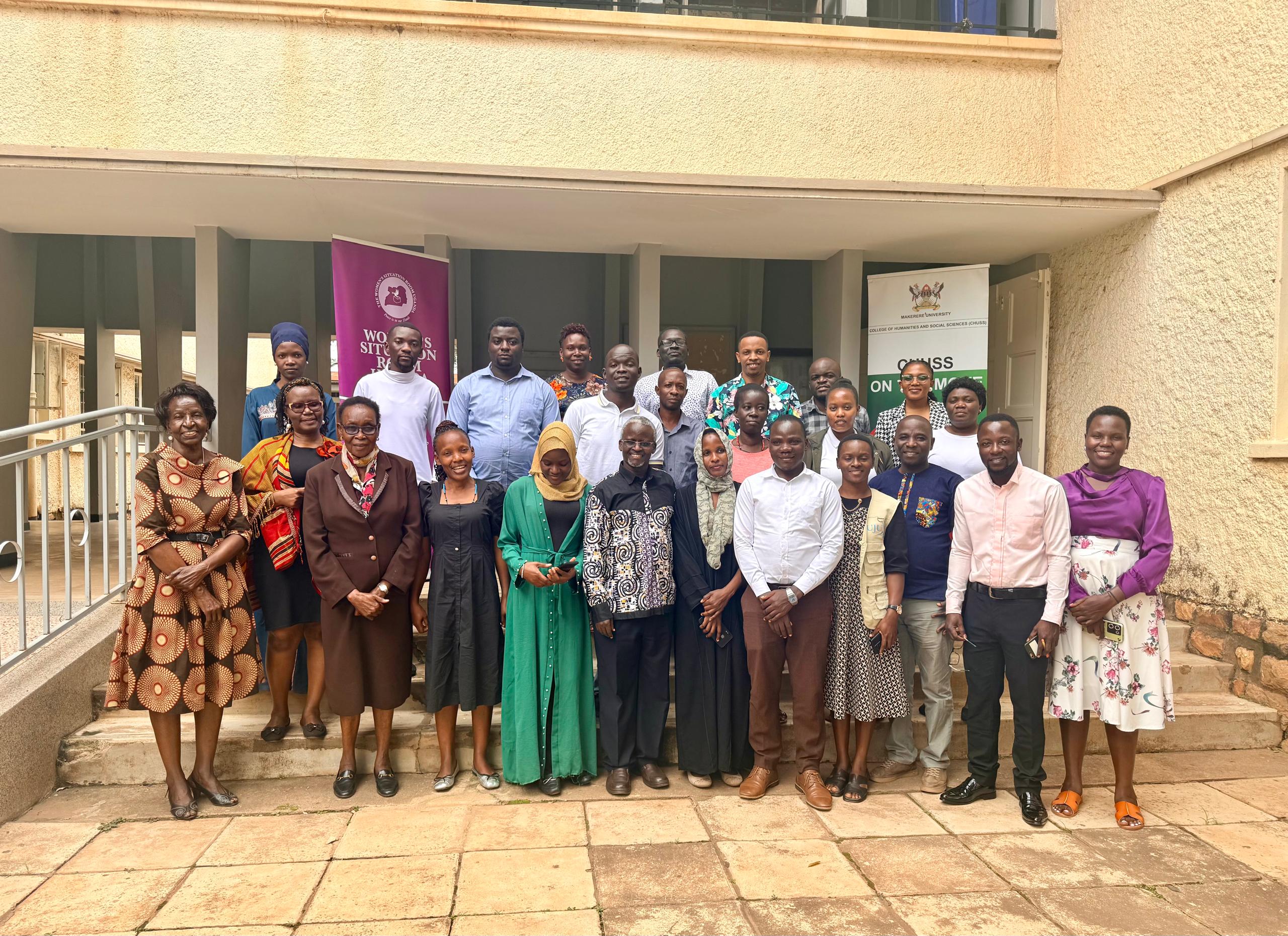
Kampala, Uganda – January 9, 2026
Ahead of the January 15 general elections, Ugandan journalists have undergone specialized training on peace and gender-sensitive reporting to ensure responsible media coverage during the election period. The two-day training, held from 8th to 9th January 2026 at Makerere University’s College of Humanities and Social Sciences Smart Room, was organized by the Women’s Situation Room (WSR) in partnership with various stakeholders and brought together journalists from across print, broadcast, and online platforms.
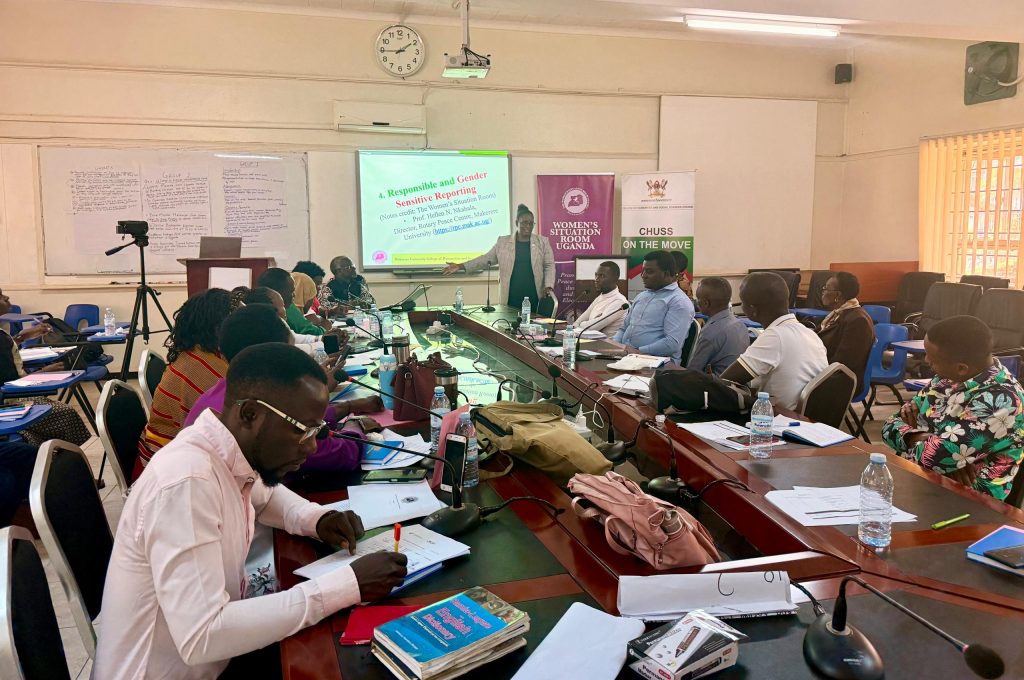
The main objective of the training was to strengthen the capacities of media in reporting and documenting electoral processes in a responsible and gender-sensitive manner. The specific objectives included: strengthening journalists’ skills to cover the 2026 elections in a fair, balanced, gender-sensitive, and non-violent partisan way; enhancing the role of media to enable citizens to be well-informed and actively participate in the election process; ensuring focused and balanced reporting on peace during and after elections; and strengthening partnerships between the WSR and media houses during the election period.
The training covered multiple critical modules. Day one focused on responsible conflict-sensitive reporting, emphasizing principles such as balance, impartiality, and accuracy. Participants explored the role of media as a relayer of the population’s voice, election monitor, catalyst for social cohesion and reconciliation, contributor to the accountability of political actors, and a platform for detecting and debunking digital media misinformation and hate speech.
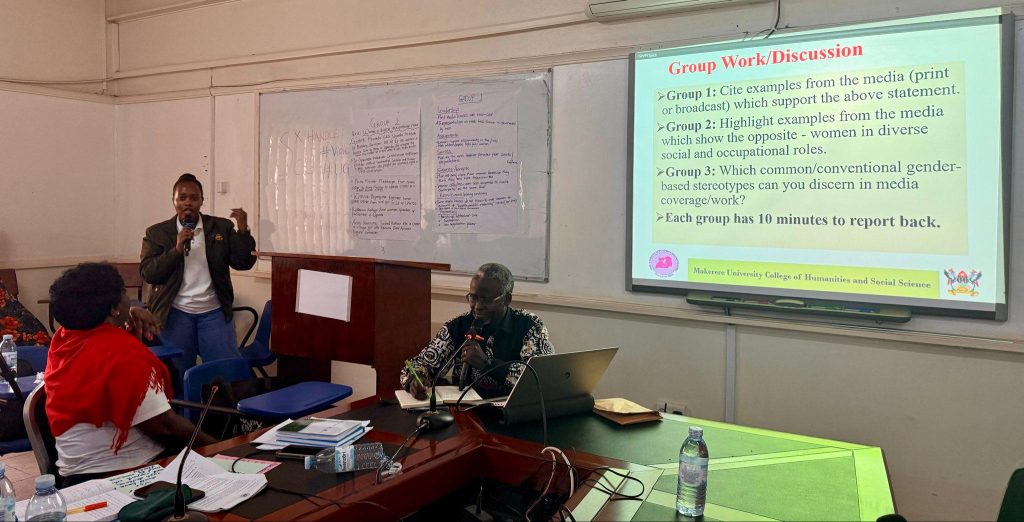
Day two addressed responsible and gender-sensitive reporting. Key aspects included the definition of gender-sensitive reporting, how to become a gender-sensitive reporter, critical elements in reporting with gender awareness, packaging gender-sensitive stories, and a checklist for detecting and avoiding gender-insensitive reporting.
Her Lordship, retired Judge Justice Mary Mayitum, emphasized the importance of peace as the foundation of development and democratic engagement. “Because we value peace more than anything. Without peace, really, you can do nothing. But where there is peace, you can have time to reflect, discuss with others, and join in meaningful dialogue,” she said. She warned that the country’s past conflicts, such as those in Gulu, underscored the necessity of maintaining national harmony.
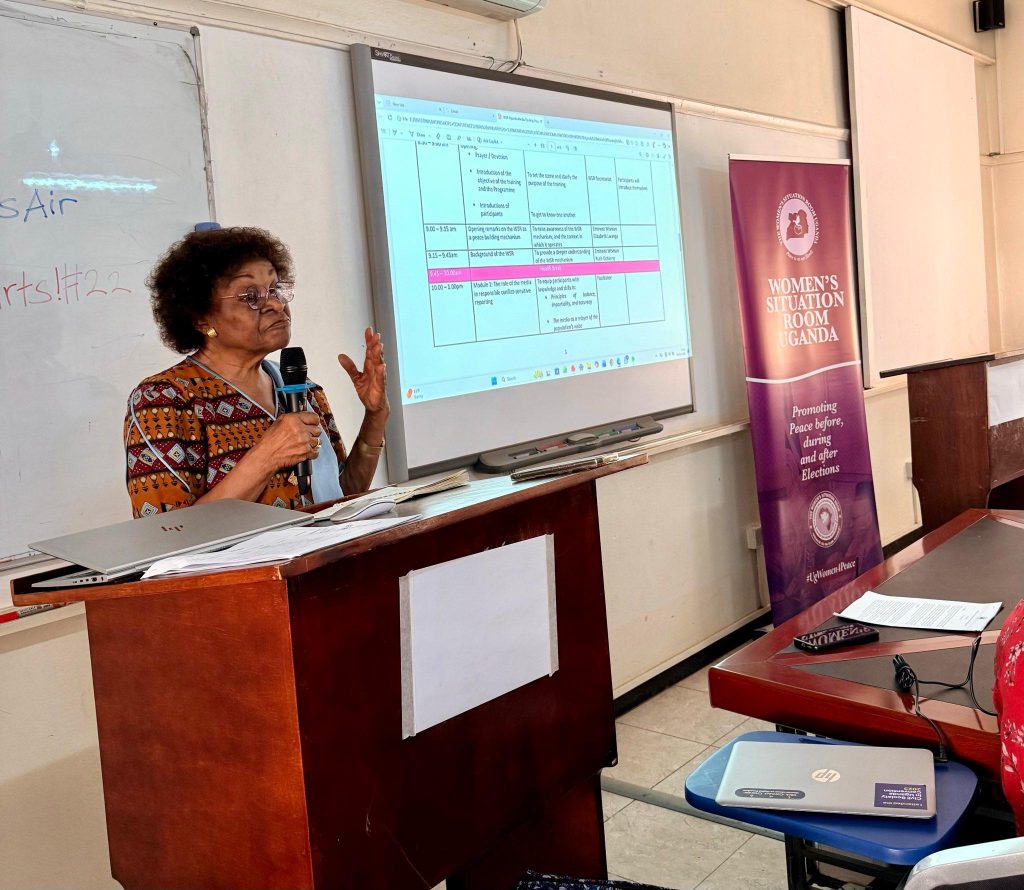
Justice Mayitum also urged other key election stakeholders to uphold peaceful conduct. “Being peaceful is the very heart of life. We have spoken to police, security personnel, political parties, and the Electoral Commission. We want politicians to have a code of conduct and to understand that it’s okay to think differently without fighting or hating one another,” she added.
Dr. William Tayebwa, lead facilitator and senior lecturer in the Department of Journalism and Communication at Makerere University, said, “This training is about conflict-sensitive reporting, peace journalism, and gender-sensitive reporting in the context of the elections. The emphasis was on giving female political candidates a voice while ensuring journalists report responsibly on election-related matters.”
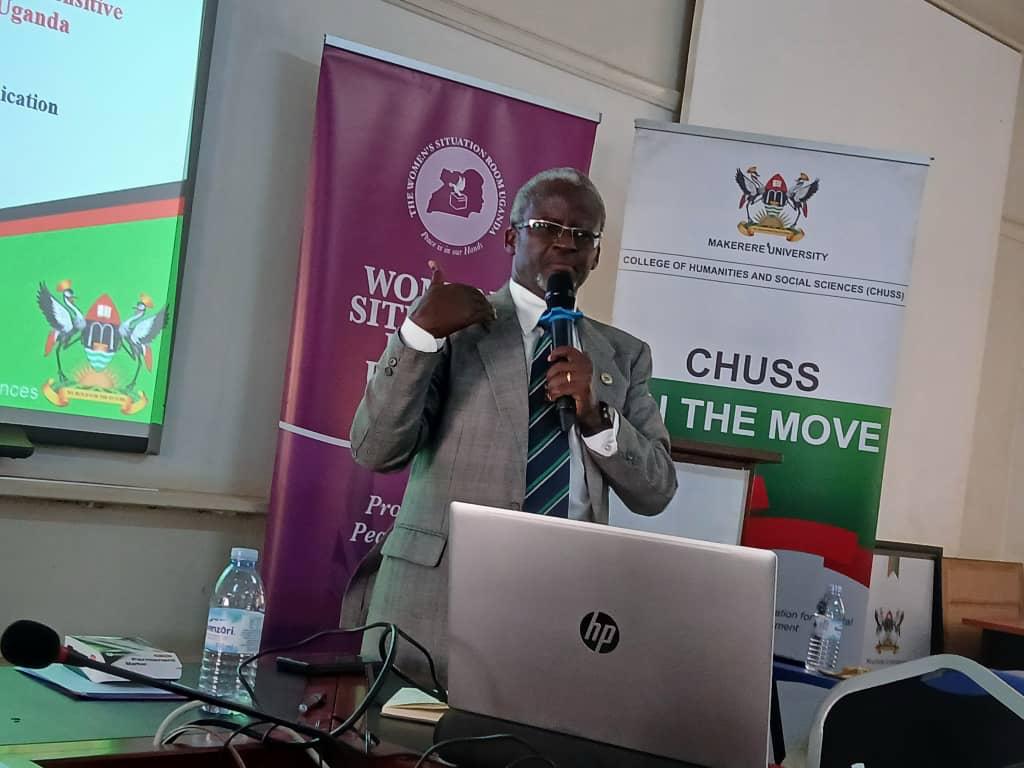
Participants described the training as timely and impactful. Tony Banizengabo of CBS Wakiso District said, “We’ve benefited a lot. We’ve been trained to write stories which bring peace, not conflict. Ahead of the elections, we are very ready to be part of peacemakers.”
Dorcas Kimono of UBC TV Kampala added, “It was so timely and rich. We learned how to report without promoting or fueling violence, giving voice to victims without angering them or encouraging violators. This is very vital, especially as we approach the 2026 elections.”
The training aims to equip media personnel with the knowledge and skills to uphold professional ethics while contributing to a peaceful, inclusive, and gender-sensitive electoral process.
Trending
-

 Humanities & Social Sciences1 week ago
Humanities & Social Sciences1 week agoMeet Najjuka Whitney, The Girl Who Missed Law and Found Her Voice
-

 General1 week ago
General1 week ago76th Graduation Highlights
-

 Agriculture & Environment2 weeks ago
Agriculture & Environment2 weeks agoUganda Martyrs Namugongo Students Turn Organic Waste into Soap in an Innovative School Project on Sustainable Waste Management
-

 Health2 weeks ago
Health2 weeks agoMakerere University School of Public Health Graduates First Cohort of Cost-Effectiveness Analysis Short Course
-

 Agriculture & Environment1 week ago
Agriculture & Environment1 week agoCAES Presents Overall Best Performing Student in the Sciences & a Record 28 PhDs at the 76th Graduation Ceremony
